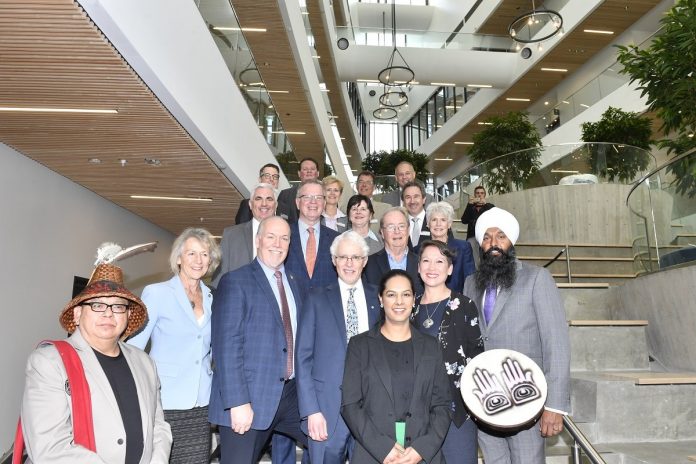 IN September 2019, Simon Fraser University (SFU) students will be able to train, for the first time, in new state-of-the-art facilities for sustainable energy engineering, a program unique to Western Canada.
IN September 2019, Simon Fraser University (SFU) students will be able to train, for the first time, in new state-of-the-art facilities for sustainable energy engineering, a program unique to Western Canada.
“Investing in clean tech innovators here at SFU Surrey will help build a cleaner, brighter future for everyone in B.C.,” said Premier John Horgan on Thursday. “The skills and experience students gain in this new building will help them succeed in B.C.’s growing clean tech sector and become leaders in the low-carbon economy of the future.”
The official opening of the $126-million building for SFU’s Surrey expansion was celebrated with Joyce Murray, President of the Treasury Board and federal Minister of Digital Government, on behalf of Navdeep Bains, federal Minister of Innovation, Science and Economic Development; Premier Horgan; Melanie Mark, B.C.’s Minister of Advanced Education, Skills and Training; Bruce Ralston, B.C.’s Minister of Jobs, Trade and Technology and MLA for Surrey-Whalley; Andrew Petter, SFU President and Vice Chancellor; and university students, faculty and staff.
“Students are the next generation of change-makers who are creating a better, more balanced and cleaner province,” Mark said. “This isn’t just a building. It’s an innovation hub where energy engineering students will design solutions for smarter communities, cleaner energy and position B.C. as a global leader in clean tech. By building 21st-century facilities, our government is educating the best people to fuel our diverse economy. SFU is playing an important part in building the best B.C.”
The new 20,458 square-metre facility creates better access for prospective tech students throughout the Lower Mainland. It accommodates 440 new full-time equivalent (FTE) student spaces and 40 faculty and staff for SFU’s new sustainable energy engineering degree programs. It also gives SFU the physical space to relocate its current 75 graduate mechatronics students to new and improved facilities.
The sustainable energy engineering programming provides an interdisciplinary approach to energy engineering by integrating science, environmental and business courses. The programs will prepare students to work in clean technology sectors, such as smart cities, clean power generation and sustainable food and water solutions.
“Our investment in SFU Surrey is giving students, teachers and researchers access to the best facilities to advance some Canada’s leading research,” Murray said. “The new building will allow students and researchers to make discoveries that benefit Surrey and all of Canada.”
The five-storey, LEED-gold-certified building, designed by the late architect Bing Thom, is adjacent to the current SFU campus at Surrey’s Central City Mall complex. It features modern wet and dry teaching labs, classrooms, study spaces, offices, a large light-filled central atrium space and a 400-seat lecture hall to serve SFU as well as the broader Surrey community.
The project budget was $126 million, with $45 million from the Government of Canada’s Post-Secondary Institutions Strategic Investment Fund, $45 million from the Government of British Columbia and $26 million from SFU and donors. SFU also provided the land, valued at $10 million.
The Province is investing in approximately 2,900 additional seats in programs at colleges, universities and institutes throughout the province as part of B.C.’s tech programming expansion. The 440 FTE seats for the new sustainable energy engineering programs is part of this expansion.
In December 2018, government launched the CleanBC strategy to cut air pollution, boost the economy and make life better for people. By moving to clean, renewable energy, B.C. can power its growing economy and make life better and more affordable for people.
The new sustainable energy engineering programming at SFU aligns with CleanBC objectives, including cutting air pollution, switching to cleaner fuels and boosting the economy. It will help British Columbians lead the clean transition by getting students industry-ready to work in high-demand clean tech and renewable energy sectors.
The tech sector in B.C., with more than 10,500 tech businesses, is one of the fastest-growing sectors of the economy, generating $31 billion in revenue and employing over 114,000 people. The demand for skilled tech workers presents immense opportunities for students.
Quick Facts
* The CleanBC strategy puts B.C. on the path to a cleaner future. Initiatives include:
– launching a standard to make all new car sales zero-emission vehicles by 2040, with a supporting plan to make them more available, convenient and affordable;
– improving fuel standards to cut carbon pollution and make air cleaner; and
– making every new building “net-zero energy ready” by the year 2032.
* Investments through the Post-Secondary Institutions Strategic Investment Fund (SIF) are being used to modernize facilities at Canadian universities and colleges, as well as improve the energy efficiency of these facilities and reduce their impact on the environment.
* British Columbia has received $257 million through the Post-Secondary Institutions SIF. Twenty public post-secondary institutions and one private First Nations institution in B.C. are benefiting from 30 individual projects throughout the province.
* The SIF portion of all 30 projects is substantially complete. With the official completion of this project at the SFU Surrey campus, there are five more projects to be opened.
* Total capital funding for all B.C. SIF projects is $708 million:
– $257 million from the Government of Canada;
– $278 million from the Province of British Columbia; and
– $173 million from post-secondary institutions and donors.










